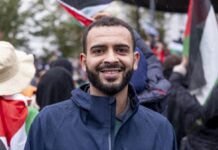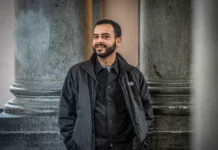
The following article, by Rawa Alsagheer, coordinator of the Samidoun Network in Brazil and member of the Masar Badil (Palestinian Alternative Revolutionary Path Movement) executive committee, was published today in Esquerda Diario in Brazil. It focuses on an Israeli security company with a major project throughout Brazil: “Hagana Security.”
Hagana Security Company: Zionism Arming Brazil
In our streets, in our buildings, and in our gated communities, a system is quietly growing. It’s not just a business project, but an ideological one. Its name: Hagana Security. And that name is no minor detail. It’s a warning—a sign of a colonial project being imported from occupied Palestine to Brazilian soil.
This article is not just an analysis. It is a political and technical indictment. But it is also a cry of resistance.
1. Nom de guerre: Colonial Memory Etched in a Brand
Hagana (Hebrew: הגנה; often spelled “Haganah” in English) doesn’t just mean “defense.” It was the name of a Zionist militia founded in 1920 to carry out ethnic cleansing against Palestinians. Between 1947 and 1948, the Hagana was responsible for horrific massacres, such as the Deir Yassin massacre, and for the displacement of hundreds of thousands of Palestinians and the destruction of over 500 Palestinian villages.
What many don’t know is that this militia collaborated with the Nazi regime in the 1930s through what was known as the Haavara Agreement, which facilitated the transfer of German Jews to Palestine in exchange for economic privileges and joint military training. Yes, when it comes to colonialism, the most criminal ideologies can align for a single goal: occupying land and replacing its people.
In Brazil, naming a security company “Hagana” is not innocent. It is a salute to a military doctrine of occupation and segregation. It is a brand that carries blood, expulsion, and racial supremacy. It is not about “defense,” but domination.
2. From Occupied Land to the Brazilian Market: Founders as Agents of Military Doctrine
Hagana Security was founded in Brazil by Chen Gilad and José-Bernardo Markuz—both former officers in the Israeli occupation army, with direct military and intelligence backgrounds from the fields of repression targeting the Palestinian people.
- Chen Gilad, the son of Israeli immigrants, served in intelligence units in Gaza and the West Bank, specializing in monitoring and dismantling civilian resistance networks. He brought to Brazil the doctrine of the “internal enemy,” which sees every civilian and civil society itself as a potential threat that must be surveilled.
- José-Bernardo Markuz, also a veteran of the Israeli occupation forces, served in border control, checkpoints, and electronic surveillance projects, and participated in operations against Palestinian protesters and civil society activists. After his military service, he returned to Brazil and joined the Hagana project as head of the intelligence and technology sector.
These men didn’t bring “civil” security expertise; they brought a colonial doctrine of repression that is now being turned into a commercial service on our soil.
Their résumés are not business credentials — they are extensions of colonial war, now applied to a new market: the everyday life of the Brazilian population.
3. Technology as a Tool of Domination: From Occupied Palestine to Surveilled Cities
Hagana doesn’t just sell security services—it offers a full-spectrum model of surveillance and control, based on technologies developed in a colonial environment, the occupied land of Palestine. Some of the tools currently in use include:
- SIGAH: A facial recognition and real-time movement analysis system.
- SABRAH: AI platform that centralizes access control, biometrics, identification via WhatsApp, and visitor management.
- CoSecurity: A network of blue poles with cameras in affluent neighborhoods—over 3,500 cameras and 1,200 surveillance poles across Greater São Paulo.
- Fast Gate, Fast Pass, vehicle monitoring, drones, connected alarms, video analytics, remote concierge services: a complete ecosystem of predictive and automated surveillance.
In Gaza, these technologies were used to hunt militants, neutralize journalists, monitor children, and punish entire families for their political affiliations. Today, the same technologies are exported to Brazil and applied against poor and working-class communities. In Brazil, the rhetoric is one of “efficiency,” but the logic is the same: identify, catalog, control, punish.
The growth of the company is alarming:
• In 2023, the Haganah Group reached R$890 million in revenue.
• It is projected to reach R$1 billion in 2024, with expansion to Curitiba, Belo Horizonte, the interior of São Paulo, and the southern region.
• Today, it already employs more than 13,000 workers.
This expansion is not entrepreneurial merit but the result of exporting a racist and colonial security doctrine.
4. Official Complicity: How Does the Brazilian State Allow This?
The most alarming aspect of all this is the silence and complicity of the Brazilian state. How can a country that claims sovereignty allow a company founded by former occupation soldiers to operate freely on its land? To collect data on millions? To monitor civilian communities without oversight?
The state, through its civil and security institutions, normalizes Hagana’s presence as if it were an ordinary security company. No one questions the founders’ backgrounds. No one reviews the source of its technology. No one debates its real objectives.
Haganah operates freely in Brazil, with public and private contracts, without any critical regulation of its ties, its history, or its methods. The Brazilian government — whether out of ignorance, opportunism, or convenience — is complicit in this process. It allows a company with a colonial DNA to collect massive amounts of data on the population, control condominium entrances, record faces, track behaviors — all without public transparency, under the label of “private initiative.”
This is not a bureaucratic error. It is a political choice.
That’s why we say clearly: Hagana cannot be confronted without also confronting this complicity. All institutional, legal, and commercial ties with the company must be immediately severed.
5. The Real Project: Racialized Surveillance, Privatization of Repression, and Digital Colonialism
Haganah’s model is the armed wing of racial surveillance capitalism. In the occupied territories of Palestine, the target was the Palestinian. In Brazil, the targets are the poor, Black, marginalized, and dissident populations. The logic is the same: framing life under suspicion.
Haganah privatizes functions that are typically state responsibilities: control of public space, collection of biometric data, indirect policing, containment of populations. All of this is sold as “high-performance security.”
But what is being installed here is a tropicalized version of the Israeli occupation. An algorithmic apartheid disguised as a technological solution. The architecture of control moves through sensors, cameras, and corporate contracts. But behind it is the same ideology that bombs hospitals in Gaza and sets up checkpoints in Nablus.
6. Resistance Starts with Boycott: There Is No Future for This Project Among Us
Break all public contracts with Haganah. Break with the normalization of Zionism as a model for urban security. Break with the idea that companies can surveil entire populations in the name of “efficiency.”
To dismantle Haganah is to dismantle a high-tech colonialism project that turns Brazilian cities into occupied zones. It is to reject the militarization of civilian life. It is to say that the Brazilian people will not be a testing ground for repression techniques exported from a genocidal military occupation.
Brazil does not need more surveillance. It needs sovereignty, dignity, and freedom.
Breaking with Hagana is breaking with the silent colonization of our territory. It is rejecting submission to the empire of the camera, of data, of fear. And above all, it is an act of solidarity with all oppressed peoples — from Palestine to the Brazilian periphery.
Discover more from Samidoun: Palestinian Prisoner Solidarity Network
Subscribe to get the latest posts sent to your email.




